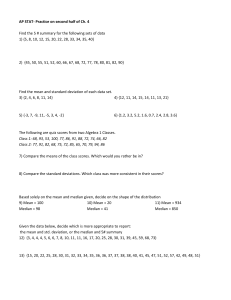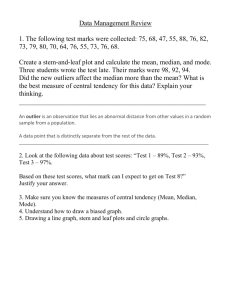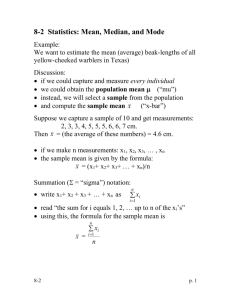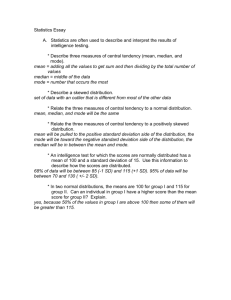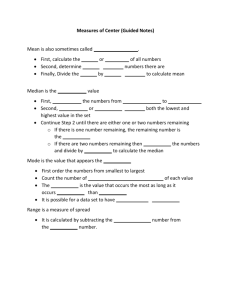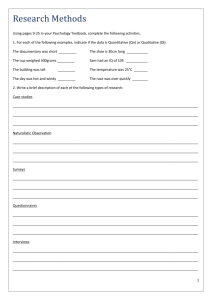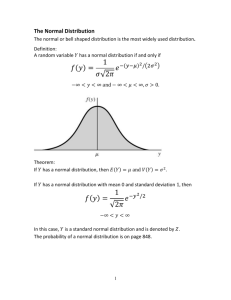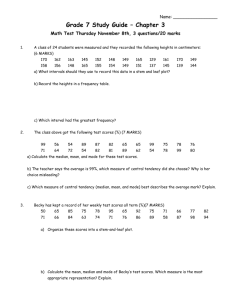free sample here
advertisement
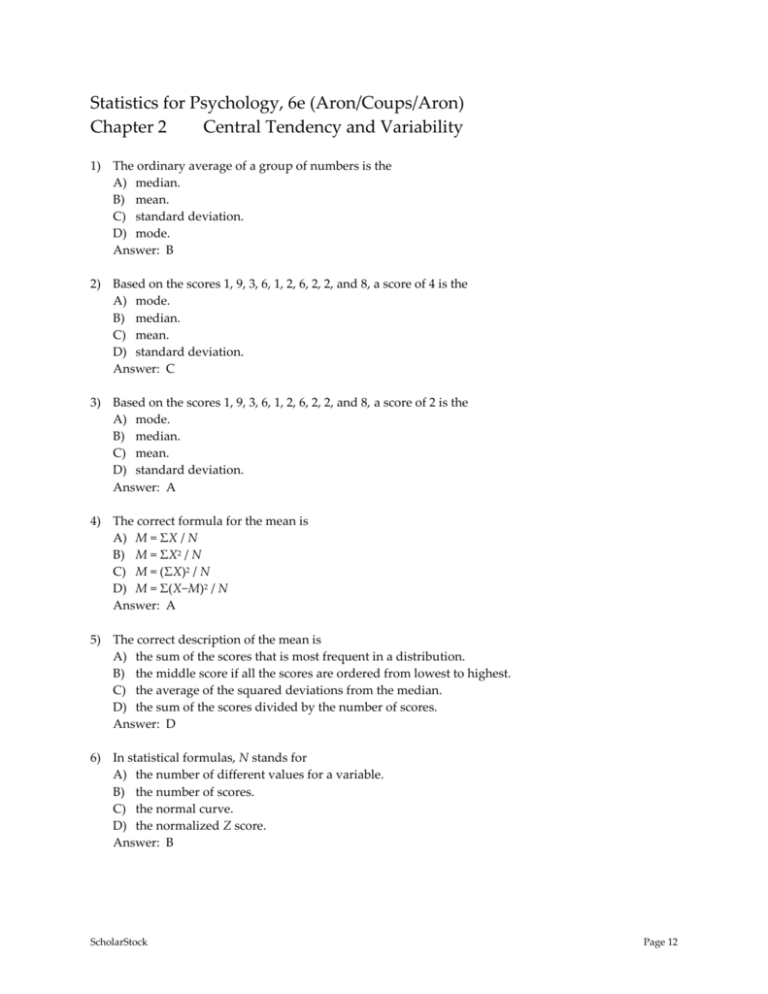
Statistics for Psychology, 6e (Aron/Coups/Aron) Chapter 2 Central Tendency and Variability 1) The ordinary average of a group of numbers is the A) median. B) mean. C) standard deviation. D) mode. Answer: B 2) Based on the scores 1, 9, 3, 6, 1, 2, 6, 2, 2, and 8, a score of 4 is the A) mode. B) median. C) mean. D) standard deviation. Answer: C 3) Based on the scores 1, 9, 3, 6, 1, 2, 6, 2, 2, and 8, a score of 2 is the A) mode. B) median. C) mean. D) standard deviation. Answer: A 4) The correct formula for the mean is A) M = ΣX / N B) M = ΣX2 / N C) M = (ΣX)2 / N D) M = Σ(X−M)2 / N Answer: A 5) The correct description of the mean is A) the sum of the scores that is most frequent in a distribution. B) the middle score if all the scores are ordered from lowest to highest. C) the average of the squared deviations from the median. D) the sum of the scores divided by the number of scores. Answer: D 6) In statistical formulas, N stands for A) the number of different values for a variable. B) the number of scores. C) the normal curve. D) the normalized Z score. Answer: B ScholarStock Page 12 7) The ΣX for the scores 1, 1, 8, and 10 is A) 4 B) 4.5 C) 5 D) 20 Answer: D 8) A psychologist studying the rate at which infants in three different countries vocalized distress obtained the scores below from each country. Which group of infants showed the highest mean rate of distress vocalization? Country A 9, 9, 10, 13, 8, 8, 11, 11, 10, 7 Country B 15, 15, 16, 9, 14, 14, 17, 17, 16, 13 Country C 4, 6, 20, 17, 15, 21, 18, 18, 25, 2 A) Country A B) Country B C) Country C D) Countries B and C were equally high. Answer: D 9) The most common single value in a group of scores is the A) mode. B) mean. C) median. D) average. Answer: A 10) The mode of the following scores 3, 4, 6, 7, 10, 10, and 30 is A) 3 B) 7 C) 8.5 D) 10 Answer: D 11) Based on the scores 1, 2, 3, 4, 5, 6, 6, 8, 8, 8, 9, and 10, a score of 8 is the A) mean. B) median. C) mode. D) standard deviation. Answer: C 12) Based on the scores 1, 2, 3, 4, 5, 6, 6, 8, 8, 8, 9, and 10, a score of 6 is the A) mean. B) median. C) mode. D) standard deviation. Answer: B ScholarStock Page 13 13) When describing a nominal variable, the best measure of central tendency to use is the A) mean. B) median. C) mode. D) standard deviation. Answer: C 14) The mean and the mode for a statistics test will be the same if the distribution is A) skewed. B) normal. C) bimodal. D) multimodal. Answer: B 15) The middle value in a set of scores arranged from lowest to highest is the A) mean. B) mode. C) average. D) median. Answer: D 16) The median of the scores 1, 2, 4, 4, 4, 6, 7, 8, 8, 9, and 10 is A) 4 B) 5.7 C) 6 D) 8 Answer: C 17) The mode of the scores 1, 2, 4, 4, 4, 6, 7, 8, 8, 9, and 10 is A) 4 B) 5.7 C) 6 D) 8 Answer: A 18) What is the median of the scores 0, 0, 0, 2, 5, 6, and 8? A) 0 B) 2 C) 2.5 D) 3 Answer: B 19) Which statement is true for the scores of 1, 2, 3, 4, 5, 5, 7, 8, 9, and 10? A) The mode is greater than the median. B) The median is greater than the mean. C) The mean is greater than the median. D) The mean is less than the mode. Answer: C ScholarStock Page 14 20) Which statement is true for the scores of 1, 2, 3, 4, 5, 5, 7, 8, 9, and 10? A) The mean is less than the median. B) The mean is less than the mode. C) The median and mode are both greater than the mean. D) The median and mode are the same. Answer: D 21) If a cognitive psychologist finds that a group of one-year-old children can name 3, 3, 3, 4, 4, 5, 6, 7, 8, 9, 10, and 35 things, the most useful measure of central tendency will be the A) mean. B) median. C) mode. D) range. Answer: B 22) A distribution is negatively skewed. The measures of central tendency are most likely to be in this order A) mean = 30, median = 50, mode = 70 B) mean = 30, median = 70, mode = 50 C) mean = 50, median = 50, mode = 50 D) mean = 70, median = 50, mode = 30 Answer: A 23) When a distribution is skewed to the right A) the median is greater than the mean. B) the mean and the median are the same. C) the mean is greater than the median. D) the mean and the median are equal. Answer: C 24) The median is greater than the mean in a distribution that is A) symmetrical. B) skewed to the right. C) normal. D) skewed to the left. Answer: D 25) In a symmetrical distribution with a mean of 15, the median would be A) equal to 15 B) less than 15 C) greater than 15 D) either B or C Answer: A ScholarStock Page 15 26) The variance is the same as the A) average of the squared deviations. B) sum of the squared deviations. C) average of the absolute deviations. D) sum of the absolute deviations. Answer: A 27) The symbol for the variance used in this chapter is A) SD2 B) SD C) √SD2 D) Σ(X−M)2 Answer: A 28) The formula for the standard deviation used in this chapter is A) SD2 B) SD C) √SD2 D) Σ(X−M)2 Answer: C 29) If the variance is 9, then the standard deviation is A) 18 B) 81 C) 3 D) 4.5 Answer: C 30) If the standard deviation is 4, the variance is A) 2 B) 4 C) 8 D) 16 Answer: D 31) In a sample of three people, the first person has a score 5 points above the mean, and the second person has a score 3 points above the mean. Which of the following provides the most accurate description of the score for the third person? A) It is below the mean. B) It is below the mean by 4 points. C) It is below the mean by 8 points. D) It cannot be described based on the information provided. Answer: C ScholarStock Page 16 32) In a sample of four people, Person A has a score 5 points below the mean, Person B has a score 3 points above the mean, and Person C has a score 2 points above the mean. Which of the following provides the most accurate description of the score for Person D? A) It is equal to 0. B) It is equal to the mean. C) It is below the mean. D) It is above the mean. Answer: B 33) A psychologist conducts a survey of job satisfaction among laborers and white-collar workers using a rating scale on which 1 indicates low satisfaction and 10 indicates high satisfaction. The findings are that laborers have a mean job satisfaction score of 4 and a variance of 1; white-collar workers have a mean job satisfaction score of 7 and a variance of 10. Which statement most completely describes the meaning of these numbers? A) White-collar workers are more satisfied than laborers. B) White-collar workers and laborers are about equally satisfied. C) Laborers generally are less satisfied than white-collar workers, but laborers are just as likely to be highly satisfied as white-collar workers are to be highly dissatisfied. D) Laborers are less satisfied than white-collar workers, and most laborers are about equally dissatisfied, while there is more variation in the satisfaction of white-collar workers. Answer: D 34) The variance is figured by dividing the sum of squared deviations by A) N. B) the mean. C) the standard deviation. D) the average Z score. Answer: A 35) The variance of the scores 1, 4, and 7 is A) 3 B) 4 C) 6 D) 9 Answer: C 36) The variance of the scores: 0, 1, 1, and 2 is A) .25 B) .5 C) √.5 D) 1 Answer: B ScholarStock Page 17 37) The standard deviation of the scores: 2, 0, 1, 8, and 4 is A) 0.67 B) 2.83 C) 3 D) 8 Answer: B 38) SS refers to A) SD2 B) variance computed using the N−1 formula C) standard deviation D) Σ(X−M)2 Answer: D 39) A psychologist studying cultural diversity who conducts a few lengthy interviews with members of various cultural communities is using A) behavioral techniques. B) quantitative techniques. C) qualitative techniques. D) positivistic techniques. Answer: C 40) Readers of research articles may expect to find the mean reported in A) the text. B) a table. C) a graph. D) any of the above. Answer: D 41) ΣX / N is the formula for the __________. Answer: mean 42) The mean of the scores 2, 2, 2, and 6 is __________. Answer: 3 43) A general name for the representative value of a group of scores is __________. Answer: central tendency 44) A score with an extremely high or low value (relative to other scores in the distribution) is a(n) __________. Answer: outlier 45) The Greek letter that means "add up all the scores that follow" is __________. Answer: Σ 46) N of the scores 6, 7, 7, and 8 is __________. Answer: 4 ScholarStock Page 18 47) The value with the most scores is the __________. Answer: mode 48) The median of the scores 6, 18, 4, 21, and 22 is __________. Answer: 18 49) If all the scores are ranked from lowest to highest, the median is the __________. Answer: middle score (or middle scores, when there is an even number of scores) 50) In the group of scores 2, 81, 82, 82, and 84, the outlier is __________. Answer: 2 51) A measure of central tendency that is not very affected by outliers is the __________. Answer: median; mode 52) The __________ is the usual way of describing the central tendency of a nominal variable. Answer: mode 53) The mean, median, and mode will be the same when the distribution is __________. Answer: perfectly symmetrical and unimodal 54) The variance of a group of scores is the average of the __________. Answer: squared deviations from the mean; squared deviations 55) The symbol used in the textbook for the variance of a group of scores is __________. Answer: SD2 56) The variance for the scores 1, 7, and 13 is __________. Answer: 24 57) The standard deviation for the scores 1, 7, and 13 is __________. Answer: 4.90 58) A deviation score is the difference between the score and the __________. Answer: mean 59) In symbols, a deviation score is __________. Answer: X−M 60) When __________ are summed, the result will always equal zero. Answer: deviation scores 61) Another way of symbolizing Σ(X−M)2 is __________. Answer: SS 62) The __________ is, approximately, the average that a score differs from the mean. Answer: standard deviation ScholarStock Page 19 63) The standard deviation is __________ the variance. Answer: the square root of 64) A mathematically equivalent version of a definitional formula that is easier to use when working by hand with many scores is a(n) __________. Answer: computational formula 65) Behaviorists such as B. F. Skinner sometimes object to the use of statistics in psychology research because averages can distort the pattern of information revealed from observing the behavior of __________. Answer: each individual case 66) Explain why the median is sometimes a better representation of central tendency than the mean. 67) Explain why the standard deviation is a better representation of variability than deviation scores. 68) Explain what each of the three most widely used measures of central tendency indicate to a psychological researcher. 69) How might psychologists combine quantitative and qualitative methodologies to improve psychological research? 70) Based on company personnel records, a psychologist reports that, "During the last year, the mean number of sick days taken by shop employees was 7.3, with a standard deviation of 6.1." Explain what this result means to a person who has never had a course in statistics. 71) A survey was conducted at a college to determine the number of hours students spent outside on weekends during the winter. For students from cold weather climates, the results were M = 8, SD = 1.5. For students from warm-weather climates, the results were M = 5, SD = 4.2. Explain what these numbers mean to a person who has never had a course in statistics, and suggest conclusions the person can draw from these results. 72) The scores of five high-school English teachers on a grammar test were 17, 19, 14, 20, and 20. a. Compute the mean, variance, and standard deviation. b. Explain what you have done and what the results mean to a person who has never had a course in statistics. Answer: A) M = 90/5 = 18; SS = 1 + 1 + 16 + 4 + 4 = 26; SD2 = 5.2; SD = 2.28. B) No answer in Test Bank. 73) A psychologist interested in people's response to art had seven people indicate their liking for a particular piece of Egyptian sculpture; their ratings were 2, 4, 4, 5, 6, 7, and 7. a. Compute the mean, variance, and standard deviation. b. Explain what you have done and what the results mean to a person who has never had a course in statistics. Answer: A) M = 35/7 = 5; SS = 9 + 1 + 1 + 0 + 1 + 4 + 4 = 20; SD2 = 2.86; SD = 1.69. B) No answer in Test Bank. ScholarStock Page 20 74) A social psychologist gave a survey to 8 active members of a small political action group about how many hours they put into the group's activities each week. The results were as follows: 19, 24, 30, 33, 40, 41, 41, and 44. a. Compute the mean, variance, and standard deviation. b. Explain what you have done and what the results mean to a person who has never had a course in statistics. Answer: A) M = 272/8 = 34; SS = 225 + 100 + 16 + 1 + 36 + 49 + 49 + 100 = 576; SD2 = 72; SD = 8.49. B) No answer in Test Bank. 75) A concierge is interested in how long it takes to bring passengers to the airport and then return to the hotel. The round-trip travel times for six taxi drivers were 45, 30, 42, 45, 41, and 43 minutes. a. Compute the mean, median, and mode. b. Based on the measures of central tendency, what can you infer about the distribution? c. Compute the variance and standard deviation. d. Explain what the results mean to a person who has never had a course in statistics. Answer: A) Mean = 246/6 = 41; Median = (42+43)/2 = 42.5; Mode = 45. B) The distribution is negatively skewed. C) SS = 16 + 121 + 1 + 16 + 0 + 4 = 158; SD2 = 26.33; SD = 5.13. D) No answer in Test Bank. ScholarStock Page 21
